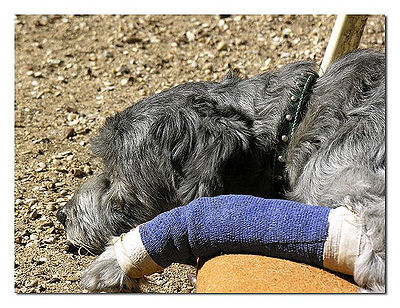Immune Mediated Hemolytic Anemia (IMHA) or Autoimmune Hemolytic Anemia (AIHA) is the destruction of red blood cells. Antibodies which target germs, attach to the cells causing the body to react and destroy them. The cause may be unknown or the result of a reaction to a drug, cancer, virus, toxin, parasite.It can occur in the […]
Pet Diseases
Educating yourself about symptoms of disease in your pets can help you notice a problem when it first arises. Once your pet has been to the veterinarian and diagnosed with a disease, it is important to be informed of the effects and treatments of that particular disease, so you can help your pet be comfortable and hopefully feel better soon.
We have listed diseases which affect more than one type of pet, as well as diseases specific to dogs, cats, horses, reptiles and birds:
- Brain Tumors in Pets
- Kidney Problems in Pets
- When euthanasia goes wrong
- The Plague and Your Pets
- Cataracts
- Bartonellosis
- Blastomycosis
- Horse Virus Outbreak
- Incontinence in Pets
- Portosystemic Shunt
- Immune Mediated Hemolytic Anemia
- Diarrhea in Pets
- Rabies
- Vestibular Disease
- Spondylosis in Pets
- Osteochondrodysplasia
- Histoplasmosis
- Signs of Heart Disease in Dogs and Cats
- Myositis in Animals
- Lipomas
- Lenticular Sclerosis
- IBD in Cats and Dogs
- Giardia
- Glaucoma in Pets
- Care of Diabetic Cats and Dogs
- Pythiosis in Pets
- Necessity of Biopsies
- Tick-Borne Babesiosis
- Rocky Mountain Spotted Fever
- Ringworm in Pets
- Neurological Problems in Pets
- Lyme Disease in Pets
- High Blood Pressure in Pets
- Does Swine Flu affect your cat or other pets?
- Chlamydia in Pets
- Cancer
- Asthma in Pets
Cat Diseases
- Hypoparathyroidism in Pets
- Encephalitis in Pets
- Osteogenesis Imperfecta in Pets
- Zika Virus and Your Pets
Horse Diseases
MoreReptile Diseases
Bird Diseases

Diarrhea in Pets
Diarrhea is a common complaint with pets. Our pets sometimes eat things that are not good for them. They may be on medications such as antibiotics that cause diarrhea. It can be related to changes in food, allergies, diseases. Whatever the reason it should be taken seriously and treated. An obvious symptom is frequent loose […]

Rabies
Rabies is a deadly virus transmitted by a bite from an infected animal. Rabies is rare in the United States thanks to the program of vaccination. However, if you have been bitten by a stray dog, cat or wild animal such as a raccoon, skunk, fox or bat, go to an emergency unit immediately. Rabies, […]

Vestibular Disease
Vestibular Disease can affect humans and dogs and cats as well as other mammals too. The vestibular system helps our body to navigate the earth. It allows our eyes, hands and legs know how to move, preventing falling. We are able to navigate on all types of terrain without dizziness or nausea. The most common […]

Spondylosis in Pets
Spondylosis is a degenerative disorder meaning it grows worse with time. It causes loss of spinal structure and function. Bone spurs (osteophytes) form at the edges of vertetrae, sometimes forming bony bridges between them. Usually, the lower back is affected, but it can occur in the neck and anywhere along the spine. Spondylosis is an […]

Osteochondrodysplasia
Osteochondrodysplasia is the term for a number of disorders where there is malformation and growth of cartilage and bone. Osteo means bone, chondro is cartilage and dysplasia is abnormal development. It is a hereditary disorder resulting in abnormal skeletal development. Deformities that occur often result in shortened limbs. In severe cases, surgery is often necessary […]

Histoplasmosis
Cats, dogs and humans can be infected with Histoplasmosis, a fungal disease. The fungus, Histoplasma capsulatum, is found in soil mainly in humid areas particularly near bodies of water. Outdoor cats and dogs are more prone to histoplasmosis, especially hunting dogs who travel over all sorts of terrain. While infection can occur at any age, […]

Signs of Heart Disease in Dogs and Cats
Just as in humans, the heart of a pet is muscle consisting of four chambers. Valves separate the chambers preventing blood from flowing back. Blood is sent to the lungs where it receives more oxygen and then travels throughout the body. If dogs develop heart disease, it is usually in the valves, occasionally in the […]

Myositis in Animals
Myositis is the the inflammation of one or more muscles. In its many forms it can affect all living creatures. It can be difficult to diagnose and is painful and usually indicates an underlying illness. While there are different forms of myositis, the most common is masticatory myositis involving the muscles used for chewing. There […]

Lipomas
The majority of lipomas are benign fatty tumors. They usually occur in older or overweight pets. They are mainly located in the subcutaneous tissue (beneath the skin) and are painless. They move slightly under your touch. Unless the lipoma is in a part of the pet’s body making him/her uncomfortable or restricting movement, most veterinarians […]
